AWARE

Garrett-Evangelical Theological Seminary | Summer 2024



Garrett-Evangelical Theological Seminary | Summer 2024

Garrett-Evangelical shapes the United Methodist General Conference. p. 4
Guiding Wisdom
President Viera reflects on the denomination’s future. p. 3
Into the World
Meet five members of the graduating class! p. 10
Collective Compassion
Dr. Acolatse offers midwifing as a model for pastoral care. p. 16

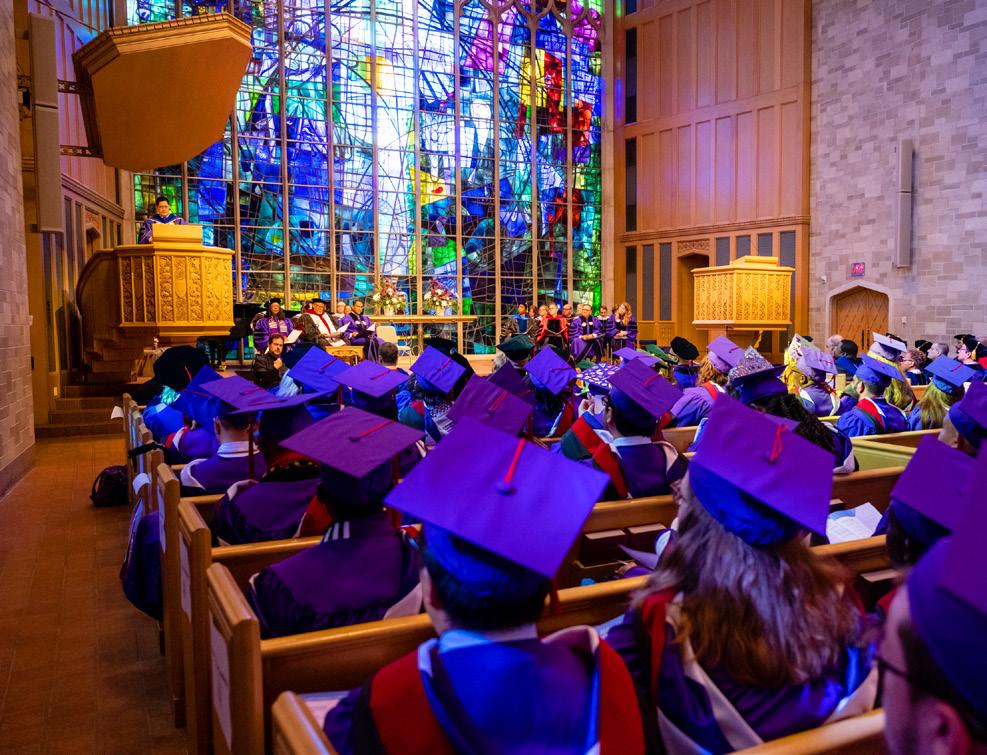
Garrett-Evangelical leads at General Conference and beyond
In visiting with Garrett-Evangelical alums and supporters around the country and globe, I hear two things frequently: First is the pride with which so many speak about their beloved seminary. The trailblazing legacies of the original schools—Garrett Biblical Institute, Chicago Training School, and Evangelical Theological Seminary—are often mentioned. The impact of pastoral leaders in congregations around the world sparks gratitude and generosity. The leadership of alum bishops in United Methodist, pan-Methodist, and autonomous Methodist churches is an often-named legacy. The seminary’s prophetic impact in advancing the leadership of women and courageously addressing matters of racial prejudice and inequity is deeply felt. In taking actions to create a fully inclusive community of learning, we call the church to account for its own failure to do so.
This tremendous legacy was on full display at the 2024 United Methodist General Conference, recently completed in Charlotte, North Carolina. The global gathering made monumental decisions that will impact the future of the church’s witness for generations to come, and importantly, Garrett-Evangelical was at the forefront. Our alumna and former trustee, Bishop Tracy Smith Malone (G-ETS 1993) assumed the church’s most prominent leadership post as president of the Council of Bishops. She is the first Black woman in the history of the church to occupy this significant position. A Garrett-Evangelical trustee, Bishop David Wilson, made history as the church’s first indigenous
bishop and preached a powerful sermon during morning worship at the conference. Bishop Julius Trimble, (G-ETS 1983) and a former trustee, assumed leadership of the General Board of Church and Society, the church’s advocacy and social witness agency. And during a celebratory recognition of Africa University’s 30th anniversary, its vice chancellor and president, two-time Garrett-Evangelical alum the Reverend Dr. Peter Mageto (G-ETS 2001 & 2004) bore witness to the university's impact throughout Africa and beyond. These
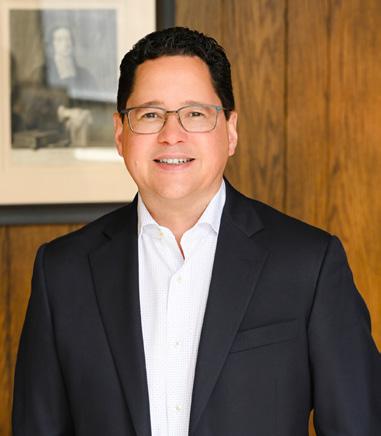
were but a few of the ways Garrett-Evangelical was present, shaping the future of the church around the world.
This brings me to the second point, a question I often hear when visiting Garrett-Evangelical alums and supporters: “Is Garrett-Evangelical still preparing pastoral leaders for congregational ministry?” It was the first question asked at a town hall I hosted two weeks after assuming my position, and it is a question that persists. I’m curious when I hear it because I know well that 70 percent of our graduates still go into congregational ministries after leaving Garrett-Evangelical, yet somehow this perception remains. In recent years, we have emphasized how ministry is changing, and we’ve highlighted our commitment to prepare
leaders for those new ministries, whether these be in bi-vocational roles, in the arts or public square, in clinical counseling, or in organizational leadership and academia. We remain deeply committed to that work and will continue to highlight the success of our graduates in emerging ministries. Yet, at General Conference, I met so many recent alums who are deeply engaged in congregational ministries and who are helping to fortify local churches with wise, compassionate, justice- and gospel-centered ministry. They are deeply committed to the work of the church, helping to heal the fractures that tear at the very fabric of community life. I am equally proud of these often young, passionate, recent alums who see renewal, possibility, and hope in the witness of their congregations—leadership Garrett-Evangelical has prepared them to offer.
Our institutional vision clearly and unapologetically states that our mission seeks “the thriving of the Church and the healing of the world.” I saw that work on full display at General Conference in the lives of our alums, those visible on stage and the many more who were not, but whose ministry is having tremendous impact and is leading church renewal around the world. They have helped me to better understand and deeply feel the pride that is palpable in being a part of this storied community. I hope you feel that too, and with your ongoing support, we can continue to build on our tremendous legacy for generations to come.
The Reverend Dr. Javier Viera President of Garrett-Evangelical Theological Seminary
Want to read more from President Viera about the implications of decisions at this year’s General Conference? Read his Christian Century feature article at garrett.edu/makingroom
Garrett-Evangelical leads at The United Methodist General Conference
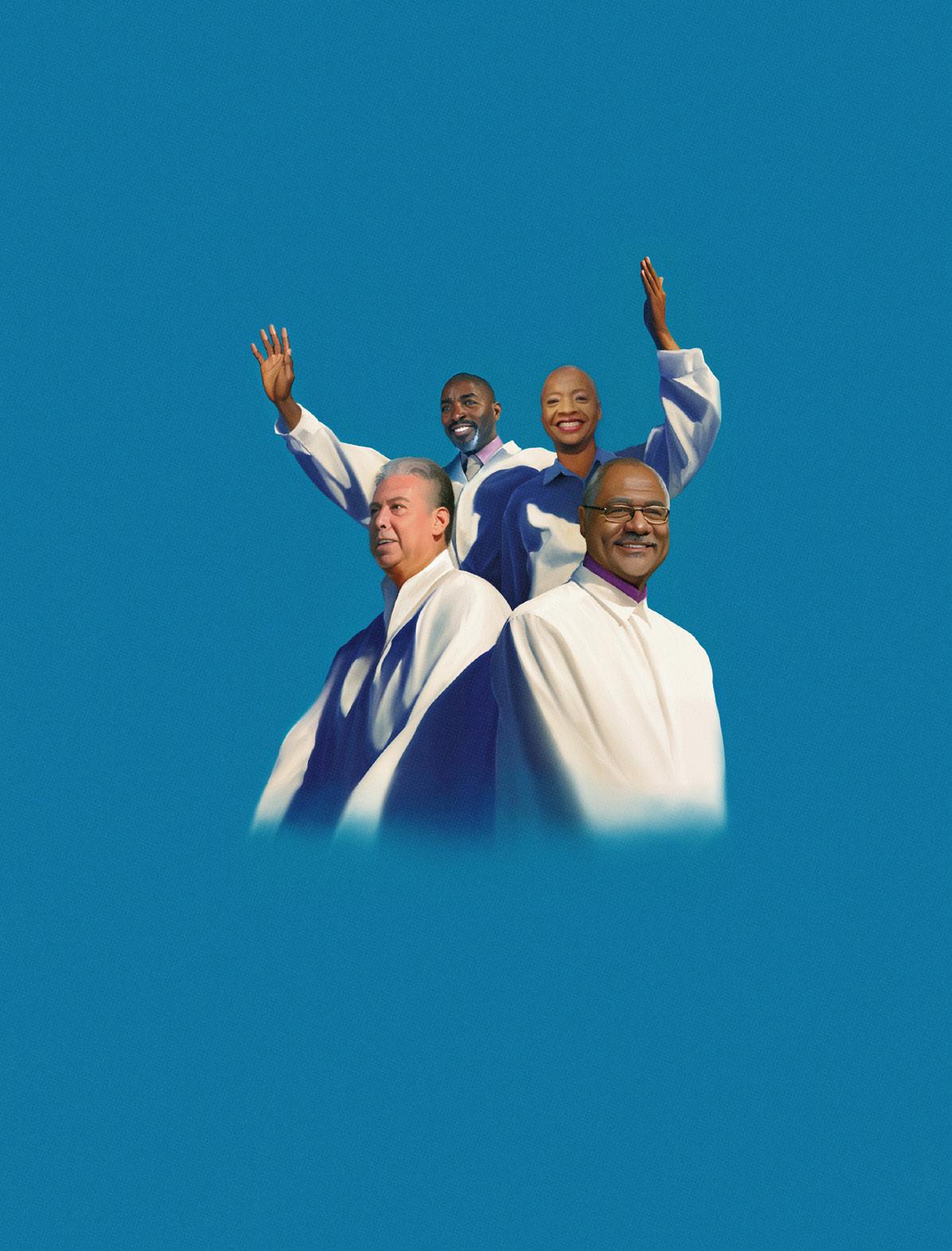
By Benjamin Perry
Afraught time” of violence, suffering, pain, loneliness, and isolation, she hoped that they will avoid a singular point of view and instead talk and listen to one another.
Also, during the service, Dr. Ahyun Lee, (G-ETS 2015) assistant professor of pastoral theology, care, and psychotherapy, was awarded the Exemplary Teacher Award for her excellence as a teacher, her service to students, her commitment to education, and her record of significant contributions to the scholarly life of Garrett-Evangelical.
t this month’s General Conference, Bishop David Wilson made history as he offered his sermonic address. Wilson, who also serves on Garrett-Evangelical’s board of trustees, is the first indigenous person to be appointed bishop in The United Methodist Church. As he entered the pulpit at such a pivotal conference, he carried the weight and promise of this opportunity. “I was so honored that the South Central College of Bishops nominated me to be one of the preachers,” he says. “But it’s also a load on my shoulders. People talk about my being the first, depending on my voice, and sometimes that’s daunting.” He wasn’t alone, however. Garrett-Evangelical staff and alumni were ubiquitous throughout the gathering, boldly leading as the conference voted on historic motions like regionalization, sacramental authority for deacons, and lifting the ban on LGBTQIA+ ordination and weddings.
For the Class of 2024, the seminary awarded seven doctor of philosophy degrees, 14 doctor of ministry degrees, three master of theological studies degrees, two master of arts in formation, culture, and educational leadership degrees, three master of arts in public ministry degrees, 12 master of arts in pastoral care and counseling degrees, and 28 master of divinity degrees. In addition, the seminary recognized one student who completed the basic graduate theological studies. †
The complicated emotions Wilson carried in his body mirror a broader complexity about where the Church has been—and where it’s headed. “I’ve served all my life and grown up in church since the 1960s before we were The United Methodist Church,” he says. “And native folk will ask me: ‘Why would you be part of a Christian Church, given its past history of how they’ve treated indigenous peoples?’” While others might shy away from navigating that pain, Wilson approaches it head-on. “This has been my life since childhood. It’s something from which I cannot hide,” he says. “My place now is to help educate people about that past. And in that, we have a long way to go.”
While The United Methodist Church has made efforts toward addressing harm—most notably the 2012 Act of Repentance with Native Peoples— Wilson points out that there’s significant difference between repair work led on behalf of a community and repair work when it’s led in partnership. “There have been well-meaning bishops who have advocated for indigenous peoples in the
“There have been well-meaning bishops who have advocated for indigenous peoples in the conference and church, but until now, there’s been no voice.”

– Bishop David Wilson
university.” Bishop Tracy Smith Malone (G-ETS 1993)—newly elected president of the Council of Bishops and the first Black woman to hold that role—concurred, calling Africa University “a gift from God.” Speaking with joy, Malone could be heard throughout the convention hall. “Education is a passport to freedom. Education is a passport to sustainability. Education is a passport to hope,” she says. “To God be the glory for what has been done and for what is yet to come.”
conference and church, but until now, there’s been no voice,” he explains. “I’ve been able to be that voice and use it.”
The Reverend Dr. Peter Mageto (G-ETS 2001 & 2004), vice chancellor of Africa University, likewise took the stage to testify about how the Zimbabwean institution is nurturing leadership. He shared that the university has graduated more than 12,000 students, who are now employed across the continent, and last year, it opened a college of applied sciences and engineering. “They are building a future where Africa’s future is fully realized,” he says. “And the cross and flame displayed on campus declares we are a United Methodist Christian
The new regionalization plan will give international churches more autonomy to shape local conferences, worship, and lay ministries to meet their communities’ most pressing needs. And sacramental authority for deacons will empower more hands to carry it out. These changes, celebrated widely by Garrett-Evangelical’s global partners, reflect the reality of The United Methodist Church: Two-thirds of Methodists now live in Africa and Asia and are already leading the church. Hopefully, these new tools will continue to uproot the legacies of colonialism and expand their ministries’ efficacy. Wilson, for his part, is quick to note that the relationship between indigenous tribes and the Methodist Church is more nuanced than an exclusive focus on colonial church harm would imply. “The history of Methodism among native people goes back to before the Trail of Tears removals,” he says. Many tribal members joined the Methodist Church in their homelands on the Southeastern United States. “When our ancestors were removed to what is now Indian territory, one of the very first things they did when they arrived in Oklahoma was to recreate their Indian Methodist churches,” Wilson recalls. “Many of these churches are now more than 180 years old.” This enduring legacy is part of what Wilson brought into the pulpit at General Conference. “I think about the faithfulness of tribal members to embrace Christianity and to believe it enough that they would make it part of their life and legacy in Oklahoma after
On Friday, May 17, the 2024 graduates of Garrett-Evangelical Theological Seminary celebrated with their family and friends and listened to advice on how to minister in this deeply divided world. The 168th annual commencement ceremony was held at the Alice Millar Chapel in Evanston, Illinois.
Commencement speaker, Dr. Eboo Patel, reminded the graduates that they have spent the last several years growing their knowledge, cultivating their skills, and deepening their faith so they can “build bridges of cooperation” in a diverse democracy.
“There are many ways to lead in a diverse democracy, and I hope you engage in all of them,” said Patel, the founder and president of Interfaith America, the leading interfaith organization in the United States. “Vote, canvas, make speeches, start an organization, join a club, run for office, lead your church, protest peacefully (but not during my speech), and host potlucks.”
A potluck, according to Patel, “is the ultimate democratic form, . . . an event of the people, by the people, for the people.” In order for it to be successful, Patel said, someone must be a leader and step up to host the potluck. “Everything always starts with a leader,” he said. “Today, I am asking you to be that person.”
that trauma,” he says. “It was a proud moment for me to tell the stories of our ancestors.”
regulation, and yes, on even more polarizing things, they are together sharing sacred stories of family rituals behind their favorite dish,” he said.
In his own Great Plains Conference, native and non-native people have been able to work together to inform the public. “Every September, there are indigenous boarding school observance events around the country,” Wilson offers as an example. “We hosted one last year, and about 150 people showed up! We had no idea it would be that many and were so very happy to educate folks.” This passion for education is part of what drew him to Garrett-Evangelical. As the seminary prepares to release a comprehensive report on the history between the school and native peoples, Wilson names the importance of telling the full truth. “John Chivington, a Methodist pastor, led a call to massacre mostly women and children at Sand Creek. John Evans, another Methodist pastor for whom Evanston is named, supported this,” he says. “Garrett-Evangelical has a connection with that, but they’re willing to talk about it.”
Patel also said that a diverse democracy requires safe spaces “where people who disagree on some fundamental things can come together on other fundamental things.” “I believe that such spaces are the solution to so many of our current challenges, particularly the challenges of polarization and isolation,” he said. “When you open your home or your church to people whose doctrine you might disagree with, but whose dish you find delicious, you are creating a sacred space for the creation of community.”
In addition to being the founder and president of Interfaith America, Patel is a civic leader who believes that religious diversity is an essential and inspiring dimension of American democracy. An Ismaili Muslim of Gujarati decent, he was named “one of America’s Best Leaders by U.S. News and World Report. Patel has also served on President Barack Obama’s Inaugural Faith Council, given hundreds of keynote addresses, and written five books.
spiritually rigorous work, but your study and formation here have prepared you to be bold, astute leaders who are up to this existential challenge.”
During the ceremony, Garrett-Evangelical conferred honorary degrees upon Patel, The Honorable Richard Gordon (GTS 1973) and Rabbi Wendi Geffen.
“This year, it was especially important to me that we recognize individuals whose work attempts to bridge divides, foster collaboration and cooperation, build interfaith and interreligious alliances, and whose voices rise above the cacophony of trite slogans and rigid ideologies, instead offering wisdom, compassion, and a call to love and serve our neighbors,” Viera said.
Wilson explains. “This Conference was so important so we could visit with one another and provide that healing.” When the vote to lift the ban on LGBTQIA+ ordination passed 692-51, jubilation rang out across the assembly. After the decision to lift the marriage the rejoicing reached even more dramatic heights—with many people spontaneously singing, “Draw the Circle Wide.” On social media, Garrett-Evangelical posted a photo of Garrett-Evangelical President Javier Viera embracing a beaming Reverend Lea Matthews, who has been working tirelessly for more than a decade to overturn these bans. “This joy testifies to the power of what we can build by offering abundant welcome,” Viera says. “It’s a vibrant hope to see so much fresh energy—and so many Garrett-Evangelical alumni— breathing life into the Church.”
Gordon, is a retired California State Assemblyman and political leader, community and social impact leader, and environmentalist. He has been an advocate for LGBTQ rights, environmental and racial justice, prison prevention and reform, and policies that protect and help vulnerable children and teens. Gordon retired after 20 years in public office and now serves as the CEO of the California Forestry Association. (See page tk for more on Gordon.)
“Education is a passport to freedom. Education is a passport to sustainability. Education is a passport to hope.”
Additionally, he said, in a democracy as at a potluck, the leader must reduce barriers, invite a diverse group of people, ask participants to make contributions, create a space where people of diverse identities and divergent ideologies can come together for enriching conversation and varied dishes, and teach people how to take responsibility for the common good.
“The magic at a potluck happens when one person’s crusty bread from Eastern Europe meets another person’s spicy dip from the Middle East, and then these people of different ethnicities and religions, who have divergent views on tax policy and environmental

– Bishop Tracy Smith Malone
In his welcome, Garrett-Evangelical President Javier Viera told the graduates that although their commencement comes at a precarious time for humanity and the earth, he wanted the graduates to focus on hope and possibility.
“You are being sent out from these hallowed halls as agents of possibility, as cultivators of communities of justice, compassion, and hope,” he said.
At a General Conference that had the potential to elicit painful feelings, Wilson was uniquely suited to name the importance of inclusion, inspiring the spirit of joy that instead reverberated through the hall. “When I think about that past, I realize we not only have an obligation in how we treat indigenous peoples in the future, but also opportunities we can create for leadership on issues across The United Methodist Church,” he says. “We understand what it’s like to be excluded from the Church. We understand what it means to be unacknowledged or treated as an afterthought. We know what it’s like to be considered less than, which is something I hear often—especially from LGBTQ+ folks in our communities.”
One of those leaders is Bishop Julius C. Trimble (G-ETS 1983), general secretary of the General Board of Church and Society. “The United Methodist Building stands across the street from the Capitol and the United States Supreme Court Building,” Trimble says. “It is a witness to The United Methodist Church’s commitment to an ethic of love that requires responsible political action along with our prayers aimed at the betterment of society and promotion of the common good across the world.”
In his speech, Gordon told the graduates that he believes that regardless of their path, the ministry calls people to be builders of community—bringing people together and holding them together; agents of change—helping people accept and embrace change; and servant leaders—putting other people first.
“While many fear the uncertainty that our future holds, I want to encourage you to see in it possibilities to lead transformation, to lead the transformation of your communities and our world in order to reflect the goodness and the intentions of our God, to proclaim in word and deed the love, the mercy, the grace, and yes, the hope that transformed communities can bring to the human family and to the earth that we share as our common home,” he continued. “It will be intellectually and
By centering on an ethos of justice and inclusion, the Church can not only repent from past harm but also create a vibrant future. “People don’t realize the gifts and talents we miss out on when we don’t include everyone,”
Geffen has been affiliated with North Shore Congregation Israel in Glencoe, Illinois since 2002, first, as part of the rabbinic team and then in 2015, as the senior rabbi. Geffen is also a leader in the national Jewish community and serves on the Executive Board of the Chicago Board of Rabbis and numerous local Jewish and communal boards. She is also a sought-after commentator on issues of interreligious and national importance.
She told the graduates that although they are graduating in “an incredibly
Ultimately, Wilson wants The United Methodist Church to move forward guided by what he and others have already been able to create in the Great Plains. “I want to name what we’re doing here, how we’re living together in this big tent,” he says. “Our folks are theologically conservative, moderate, and progressive, living together as The United Methodist Church.” This diversity is what it means to be the body of Christ and can foster vibrant coalitions. “It’s what makes this denomination so beautiful,” Wilson concludes. “We don’t all have to think alike or act alike, but we have our common goal to make disciples and the transform the world, which is in such a great need of transformation.”
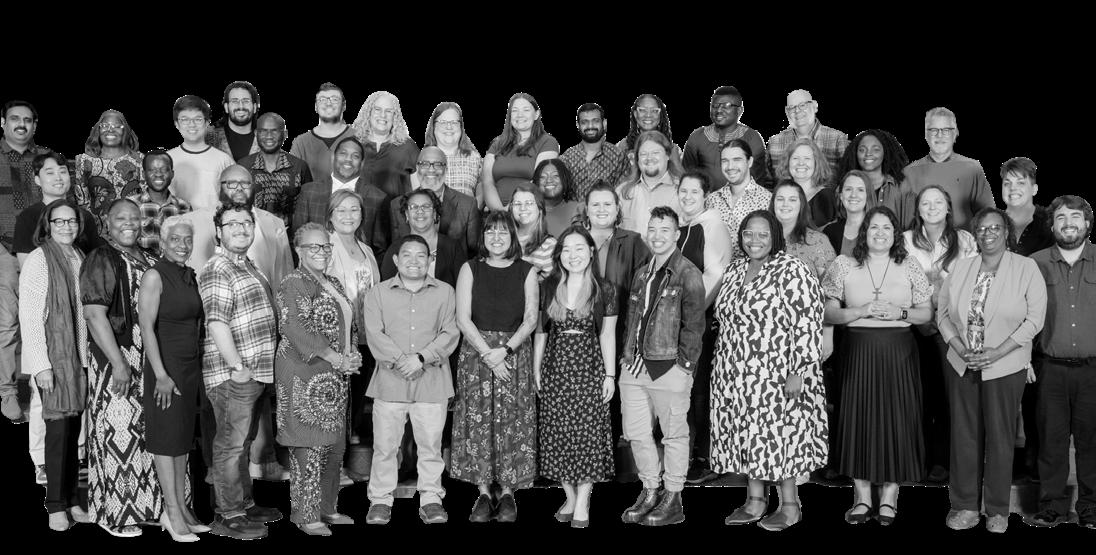

Garrett-Evangelical Theological Seminary Celebrates its 168th Commencement Ceremony
By Katharine Duke
On Friday, May 17, the 2024 graduates of Garrett-Evangelical Theological Seminary celebrated with their family and friends and listened to advice on how to minister in this deeply divided world. The 168th annual commencement ceremony was held at the Alice Millar Chapel in Evanston, Illinois.
Commencement speaker, Dr. Eboo Patel, reminded the graduates that they have spent the last several years growing their knowledge, cultivating their skills, and deepening their faith so they can “build bridges of cooperation” in a diverse democracy.
“There are many ways to lead in a diverse democracy, and I hope you engage in all of them,” said Patel, the founder and president of Interfaith America, the leading interfaith organization in the United States. “Vote,
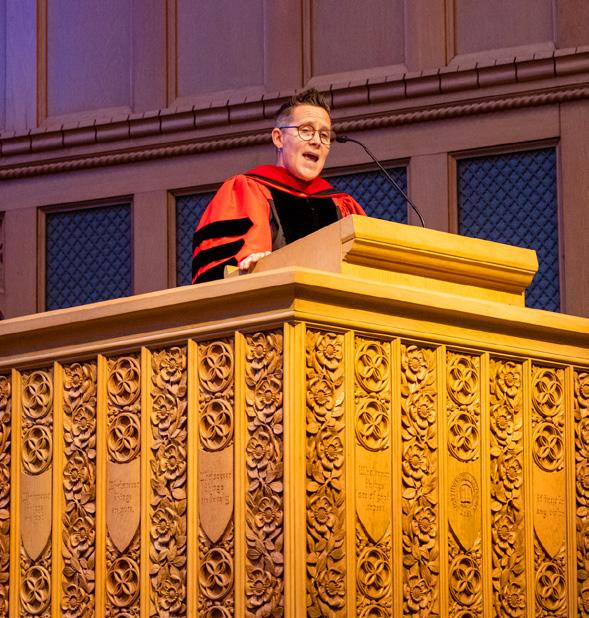
lead your church, protest peacefully (but not during my speech), and host potlucks.”
canvas, make speeches, start an organization, join a club, run for office, lead your church, protest peacefully (but not during my speech), and host potlucks.”
A potluck, according to Patel, “is the ultimate democratic form, . . . an event of the people, by the people, for the people.” In order for it to be successful, Patel said, someone must be a leader and step up to host the potluck. “Everything always starts with a leader,” he said. “Today, I am asking you to be that person.”
A potluck, according to Patel, “is the ultimate democratic form, . . . an event of the people, by the people, for the people.” In order for it to be successful, Patel said, someone must be a leader and step up to host the potluck. “Everything always starts with a leader,” he said. “Today, I am asking you to be that person.”
Additionally, he said, in a democracy as at a potluck, the leader must reduce barriers, invite a diverse group of people, ask participants to make contributions, create a space where people of diverse identities and divergent ideologies can come together for enriching conversation and varied dishes, and teach people how to take responsibility for the common good.
regulation, and yes, on even more polarizing things, they are together sharing sacred stories of family rituals behind their favorite dish,” he said.
Patel also said that a diverse democracy requires safe spaces “where people who disagree on some fundamental things can come together on other fundamental things.” “I believe that such spaces are the solution to so many of our current challenges, particularly the challenges of polarization and isolation,” he said. “When you open your home or your church to people whose doctrine you might disagree with, but whose dish you find delicious, you are creating a sacred space for the creation
Additionally, he said, in a democracy as at a potluck, the leader must reduce barriers, invite a diverse group of people, ask participants to make contributions, create a space where people of diverse identities and divergent ideologies can come together for enriching conversation and varied dishes, and teach people how to take responsibility for the common good.
“The magic at a potluck happens when one person’s crusty bread from Eastern Europe meets another person’s spicy dip from the Middle East, and then these
“The magic at a potluck happens when one person’s crusty bread from Eastern Europe meets another person’s spicy dip from the Middle East, and then these people of different ethnicities and religions, who have divergent views on tax policy and environmental
people of different ethnicities and religions, who have divergent views on tax policy and environmental regulation, and yes, on even more polarizing things, they are together sharing sacred stories of family rituals behind their favorite dish,” he said.
spiritually rigorous work, but your study and formation here have prepared you to be bold, astute leaders who are up to this existential challenge.”
During the ceremony, Garrett-Evangelical conferred honorary degrees upon Patel, The Honorable Richard Gordon (GTS 1973) and Rabbi Wendi Geffen.
“This year, it was especially important to me that we recognize individuals whose work attempts to bridge divides, foster collaboration and cooperation, build interfaith and interreligious alliances, and whose voices rise above the cacophony of trite slogans and rigid ideologies, instead offering wisdom, compassion, and a call to love and serve our neighbors,” Viera said.
Recognizing Excellence: The Reverend Dr. Jennifer Harvey presents the exemplary teacher of the year award.
In addition to being the founder and president of Interfaith America, Patel is a civic leader who believes that religious diversity is an essential and inspiring dimension of American democracy.
An Ismaili Muslim of Gujarati decent, he was named “one of America’s Best Leaders by U.S. News and World Report. Patel has also served on President Barack Obama’s Inaugural Faith Council, given hundreds of keynote addresses, and written five books.
In his welcome, Garrett-Evangelical President Javier Viera told the graduates that although their commencement comes at a precarious time for humanity and the earth, he wanted the graduates to focus on hope and possibility.
“You are being sent out from these hallowed halls as agents of possibility, as cultivators of communities of justice, compassion, and hope,” he said.
“While many fear the uncertainty that our future holds, I want to encourage you to see in it possibilities to lead transformation, to lead the transformation of your communities and our world in order to reflect the goodness and the intentions of our God, to proclaim in word and deed the love, the mercy, the grace, and yes, the hope that transformed communities can bring to the human family and to the earth that we share as our common home,” he continued. “It will be intellectually and
“Everything always starts with a leader. Today, I am asking you to be that person.”
Patel also said that a diverse democracy requires safe spaces “where people who disagree on some fundamental things can come together on other fundamental things.” “I believe that such spaces are the solution to so many of our current challenges, particularly challenges of polarization and isolation,” he said. “When you open your home or your church to people whose doctrine you might disagree with, but whose dish you find delicious, you are creating a sacred space for the creation of community.”
Gordon, is a retired California State Assemblyman and political leader, community and social impact leader, and environmentalist. He has been an advocate for LGBTQ rights, environmental and racial justice, prison prevention and reform, and policies that protect and help vulnerable children and teens. Gordon retired after 20 years in public office and now serves as the CEO of the California Forestry Association. (See page tk for more on Gordon.)
In addition to being the founder and president of Interfaith America, Patel is a civic leader who believes that religious diversity is an essential and inspiring dimension of American democracy. An Ismaili Muslim of Gujarati decent, he was named “one of America’s Best Leaders" by U.S. News and World Report Patel has also served on President Barack Obama’s Inaugural Faith Council, given hundreds of keynote addresses, and written five books.
In his welcome, Garrett-Evangelical President Javier Viera told the graduates that although their commencement comes at a precarious time for humanity and the earth, he wanted the graduates to focus on hope and possibility.
In his speech, Gordon told the graduates that he believes that regardless of their path, the ministry calls people to be builders of community—bringing people together and holding them together; agents of change—helping people accept and embrace change; and servant leaders—putting other people first.
Geffen has been affiliated with North Shore Congregation Israel in Glencoe, Illinois since 2002, first, as part of the rabbinic team and then in 2015, as the senior rabbi. Geffen is also a leader in the national Jewish community and serves on the Executive Board of the Chicago Board of Rabbis and numerous local Jewish and communal boards. She is also a sought-after commentator on issues of interreligious and national importance.
“You are being sent out from these hallowed halls as agents of possibility, as cultivators of communities of justice, compassion, and hope,” he said.
“While many fear the uncertainty that our future holds, I want to encourage you to see in it possibilities to lead transformation, to lead the transformation of your communities and our world in order to reflect the goodness and the intentions of our God, to proclaim in word and deed the love, the mercy, the grace, and yes, the hope that transformed communities can bring
She told the graduates that although they are graduating in “an incredibly
to the human family and to the earth that we share as our common home,” he continued. “It will be intellectually and spiritually rigorous work, but your study and formation here have prepared you to be bold, astute leaders who are up to this existential challenge.”
fraught time” of violence, suffering, pain, loneliness, and isolation, she hoped that they will avoid a singular point of view and instead talk and listen to one another.
protect and help vulnerable children and teens. Gordon retired after 20 years in public office and now serves as the CEO of the California Forestry Association. (See page 14 for more on Gordon.)
Also, during the service, Dr. Ahyun Lee, (G-ETS 2015) assistant professor of pastoral theology, care, and psychotherapy, was awarded the Exemplary Teacher Award for her excellence as a teacher, her service to students, her commitment to education, and her record of significant contributions to the scholarly life of Garrett-Evangelical.
During the ceremony, Garrett-Evangelical conferred honorary degrees upon Patel, The Honorable Richard Gordon (GTS 1973) and Rabbi Wendi Geffen.
“This year, it was especially important to me that we recognize individuals whose work attempts to bridge divides, foster collaboration and cooperation, build interfaith and interreligious alliances, and whose voices rise above the cacophony of trite slogans and rigid ideologies, instead offering wisdom, compassion, and a call to love and serve our neighbors,” Viera said.
For the Class of 2024, the seminary awarded seven doctor of philosophy degrees, 14 doctor of ministry degrees, three master of theological studies degrees, two master of arts in formation, culture, and educational leadership degrees, three master of arts in public ministry degrees, 12 master of arts in pastoral care and counseling degrees, and 28 master of divinity degrees. In addition, the seminary recognized one student who completed the basic graduate theological studies. †
Gordon, is a retired California State Assemblyman and political leader, community and social impact leader, and environmentalist. He has been an advocate for LGBTQIA+ rights, environmental and racial justice, prison prevention and reform, and policies that
In his speech, Gordon told the graduates that he believes that regardless of their path, the ministry calls people to be builders of community—bringing people together and holding them together; agents of change—helping people accept and embrace change; and servant leaders—putting other people first.
Geffen has been affiliated with North Shore Congregation Israel in Glencoe, Illinois since 2002, first, as part of the rabbinic team and then in 2015, as the senior rabbi. Geffen is also a leader in the national Jewish community and serves on the Executive Board of the Chicago Board of Rabbis and numerous local Jewish and communal boards. She is also a sought-after commentator on issues of interreligious and national importance.
She told the graduates that although they are graduating in “an incredibly
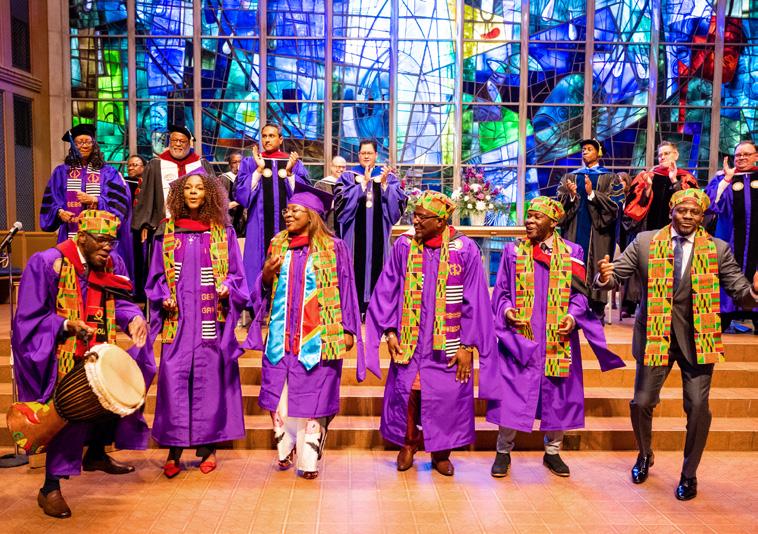
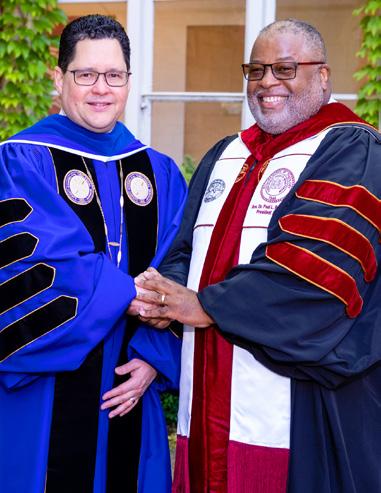
fraught time” of violence, suffering, pain, loneliness, and isolation, she hoped that they will avoid a singular point of view and instead talk and listen to one another.
Also, during the service, Dr. Ahyun Lee, (G-ETS 2015) assistant professor of pastoral theology, care, and psychotherapy, was awarded the Exemplary Teacher Award for her excellence as a teacher, her service to students, her commitment to education, and her record of significant contributions to the scholarly life of Garrett-Evangelical.
For the Class of 2024, the seminary awarded seven doctor of philosophy degrees, 14 doctor of ministry degrees, three master of theological studies degrees, two master of arts in formation, culture, and educational leadership degrees, three master of arts in public ministry degrees, 12 master of arts in pastoral care and counseling degrees, and 28 master of divinity degrees. In addition, the seminary recognized one student who completed the basic graduate theological studies. †

n Friday, May 17, the 2024 graduates of Garrett-Evangelical Theological Seminary celebrated with their family and friends and listened to advice on how to minister in this deeply divided world. The 168th annual commencement ceremony was held at the Alice Millar Chapel in Evanston, Illinois.
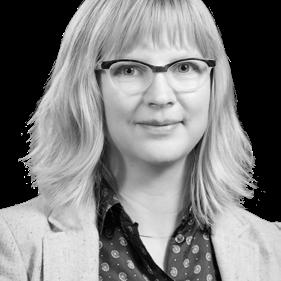
Kristen Daley Mosier, PhD
“There are many ways to lead in a diverse democracy, and I hope you engage in all of them,” said Patel, the founder and president of Interfaith America, the leading interfaith organization in the United States. “Vote, canvas, make speeches, start an organization, join a club, run for office, lead your church, protest peacefully (but not during my speech), and host potlucks.”
Commencement speaker, Dr. Eboo Patel, reminded the graduates that they have spent the last several years growing their knowledge, cultivating their skills, and deepening their faith so they can “build bridges of cooperation” in a diverse democracy.
regulation, and yes, on even more polarizing things, they are together sharing sacred stories of family rituals behind their favorite dish,” he said.
By Benjamin Perry
spiritually rigorous work, but your study and formation here have prepared you to be bold, astute leaders who are up to this existential challenge.”
WE’RE FAMILIAR WITH water as an essential and defining feature of baptism, yet few baptismal theologies treat it like an active participant in the sacrament. For Dr. Kristen Daley Mosier, however, this oversight disregards the sacredness of water within the ritual and contributes to theologies that diminish its worth in the rest of our lives. “As I was studying baptismal theology, it started to dawn on me that it’s all about water, yet we’re not talking about particular waters,” she tells me. “I started to wonder: Why is that? And what happens when we do talk about particular waters?”
A potluck, according to Patel, “is the ultimate democratic form, . . . an event of the people, by the people, for the people.” In order for it to be successful, Patel said, someone must be a leader and step up to host the potluck. “Everything always starts with a leader,” he said. “Today, I am asking you to be that person.”
Additionally, he said, in a democracy as at a potluck, the leader must reduce barriers, invite a diverse group of people, ask participants to make contributions, create a space where people of diverse identities and divergent ideologies can come together for enriching conversation and varied dishes, and teach people how to take responsibility for the common good.
“The magic at a potluck happens when one person’s crusty bread from Eastern Europe meets another person’s spicy dip from the Middle East, and then these people of different ethnicities and religions, who have divergent views on tax policy and environmental
To investigate this further, she wrote her dissertation examining baptismal theology through a watershed lens, a process that opened new frontiers for both her understanding of the sacrament and appreciation of our ecological interconnectedness. “The work of Ched Meyer's Watershed Discipleship came into play in asking, ‘What role does water play?’” she says, “not just sacramentally, but also ecologically and possibly even subjectively, as we see a shift from thinking of nature as inanimate to considering it through the notion of subjectivity—that we
are partnering with water to bring persons into the community of Christ and into the Church.” In the Bible, we read that water is present in God’s very act of creation. It is an integral part of creating and sustaining life in a theological sense, in addition to the quite literal one. When governments and/ or corporations abuse the watershed, God’s people suffer. And that harm affects the baptismal act, too.
Patel also said that a diverse democracy requires safe spaces “where people who disagree on some fundamental things can come together on other fundamental things.” “I believe that such spaces are the solution to so many of our current challenges, particularly the challenges of polarization and isolation,” he said. “When you open your home or your church to people whose doctrine you might disagree with, but whose dish you find delicious, you are creating a sacred space for the creation of community.”
During the ceremony, Garrett-Evangelical conferred honorary degrees upon Patel, The Honorable Richard Gordon (GTS 1973) and Rabbi Wendi Geffen.
“This year, it was especially important to me that we recognize individuals whose work attempts to bridge divides, foster collaboration and cooperation, build interfaith and interreligious alliances, and whose voices rise above the cacophony of trite slogans and rigid ideologies, instead offering wisdom, compassion, and a call to love and serve our neighbors,” Viera said.
In addition to being the founder and president of Interfaith America, Patel is a civic leader who believes that religious diversity is an essential and inspiring dimension of American democracy. An Ismaili Muslim of Gujarati decent, he was named “one of America’s Best Leaders by U.S. News and World Report. Patel has also served on President Barack Obama’s Inaugural Faith Council, given hundreds of keynote addresses, and written five books.
In his welcome, Garrett-Evangelical President Javier Viera told the graduates that although their commencement comes at a precarious time for humanity and the earth, he wanted the graduates to focus on hope and possibility.
“You are being sent out from these hallowed halls as agents of possibility, as cultivators of communities of justice, compassion, and hope,” he said.
As part of her studies at GarrettEvangelical, Daley Mosier worked with Dr. Andrew Wymer to interview pastors in Flint, Michigan about how the Flint water crisis changed baptism in churches. “We asked the question: Would you ever consider baptizing using water from the Flint River?” she remembers. “Very quickly, they said, ‘No,’ and there was usually a bit of a chortle with the ‘No,’” as if the idea of baptizing people in the community’s natural water was absurd on its face. These issues of environmental racism and ecological injustice are too often absent in scholarly work where they should be present. “I’m reading rewilding conversations and all this eco-theology that says, ‘let’s take our sacraments back outdoors, she notes. “Then I hear the Flint clergy saying, ‘Our people would never get baptized in the Flint River because it has a storied history of being very unclean.’ It’s haunting.”
after I did my coursework,” she says. “My dad was a fisheries consultant, so I grew up checking stream habitat for fish, traipsing along behind him looking for frogs.” A glow spreads across her face as she recounts this memory; it’s the contentment of someone who hears and knows her call. In addition to working with two local churches, she has also become connected with Earth Ministry and Washington Interfaith Power and Light to find ways to use her theological training to serve their ecological justice work and attempts to clean up the Duwamish River. “I know it will be a quilted career,” she says. “This is what it means to do theology in place.”
Gordon, is a retired California State Assemblyman and political leader, community and social impact leader, and environmentalist. He has been an advocate for LGBTQ rights, environmental and racial justice, prison prevention and reform, and policies that protect and help vulnerable children and teens. Gordon retired after 20 years in public office and now serves as the CEO of the California Forestry Association. (See page tk for more on Gordon.)

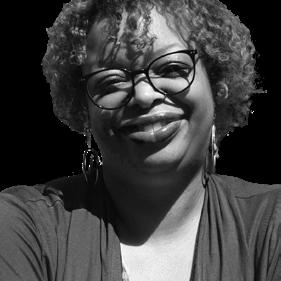
In his speech, Gordon told the graduates that he believes that regardless of their path, the ministry calls people to be builders of community—bringing people together and holding them together; agents of change—helping people accept and embrace change; and servant leaders—putting other people first.
Ultimately part of the work to prevent future water crises is reestablishing a relationship with local watersheds. It’s a relationship to which Daley Mosier became increasingly aware throughout this academic journey. “One of the things about doing a watershed-oriented research project is that I realized just how connected I am to my own watershed—it was a primary reason that my spouse and I moved back to Seattle
“While many fear the uncertainty that our future holds, I want to encourage you to see in it possibilities to lead transformation, to lead the transformation of your communities and our world in order to reflect the goodness and the intentions of our God, to proclaim in word and deed the love, the mercy, the grace, and yes, the hope that transformed communities can bring to the human family and to the earth that we share as our common home,” he continued. “It will be intellectually and
Jorja Porter, MDiv
Geffen has been affiliated with North Shore Congregation Israel in Glencoe, Illinois since 2002, first, as part of the rabbinic team and then in 2015, as the senior rabbi. Geffen is also a leader in the national Jewish community and serves on the Executive Board of the Chicago Board of Rabbis and numerous local Jewish and communal boards. She is also a sought-after commentator on issues of interreligious and national importance.
She told the graduates that although they are graduating in “an incredibly
THERE’S A PARTICULAR feeling when you talk with someone whose love for God radiates to the point where it’s infectious, even across a computer screen. As I speak with Jorja Porter, who graduated from Garrett-Evangelical with her MDiv in May, I see passion for sharing the gospel flash behind
her eyes. “I recently pulled out my statement of purpose from my Garrett-Evangelical application, and one of the things I wrote was that my love for God and my faith is everything. It’s everything,” she shares.
fraught time” of violence, suffering, pain, loneliness, and isolation, she hoped that they will avoid a singular point of view and instead talk and listen to one another.
Also, during the service, Dr. Ahyun Lee, (G-ETS 2015) assistant professor of pastoral theology, care, and psychotherapy, was awarded the Exemplary Teacher Award for her excellence as a teacher, her service to students, her commitment to education, and her record of significant contributions to the scholarly life of Garrett-Evangelical.
up getting a certificate in evangelism and church planting because I love the idea of discipleship.”
this potent faith takes her, one thing is clear: loving God and God’s people is her purpose and priority.

While her gratitude for God’s goodness is abundant, she also recognizes and names the obstacles and barriers many Black women encounter in the institutional church in trying to pursue ministry. “My thesis is about nurturing transformative leadership in Black clergy women,” Porter says. “I thought about some of the experiences that I’ve had receiving help and being nurtured—not just as a person but particularly as a Black woman. There is help and then there is being nurtured. Being nurtured means providing care and access to resources that can elevate me spiritually, financially, and professionally so that a path toward a transformative trajectory of success is attainable.” Too often, she says, Black women’s gifts and labor go unacknowledged. “When I think about all the conversations, I’ve had about this with other Black women,” she laughs, “we can finish each other’s sentences when it comes to that.”
As she talks, I can hear how Porter’s experiences shape the kinds of ministry she will pursue. “When I was a kid, there was a time my father—the late Reverend Dr. John R. Kwame Porter (GTS 1962) — didn’t have a church, so my brothers and sisters and I would gather in my parents’ bedroom, and we would have church,” she recalls. “We would sing together, have Bible study, and hear a sermon.”
For the Class of 2024, the seminary awarded seven doctor of philosophy degrees, 14 doctor of ministry degrees, three master of theological studies degrees, two master of arts in formation, culture, and educational leadership degrees, three master of arts in public ministry degrees, 12 master of arts in pastoral care and counseling degrees, and 28 master of divinity degrees. In addition, the seminary recognized one student who completed the basic graduate theological studies. †
This chronic underappreciation has cumulative effects. “Removing selfdoubt has been essential for me as a Black woman,” Porter notes. “I didn’t even realize I was feeling unvalued because I accepted the way people treated or discredited my experience in the past.” It’s an experience she knows many other Black women share. “We have so much inherited trauma that makes it hard for many of us to even talk about these feelings. Our faith is what allows us to be able to accept and forgive and continue with the call God has placed on our lives,” she says. In that pronouncement, we hear Porter’s conviction in the future God ordains—both in her personal ministry and the Church. “One of the things I’ve loved most at Garrett-Evangelical is my work with Dr. Mark Teasdale on how we actively engage people to spread the good news,” she says. “I actually ended
Ultimately, what matters to her most isn’t the trappings of a building but the kind of life-transforming faith that’s nurtured. “Right now, people are in need of community, they’re in need of religious comfort, and they’re in need of God’s love,” she concludes. “I just want everyone to understand what it means to live a life pleasing to God. It doesn’t matter who you are, where you’re from, what you look like, or what you’ve been through. Do you want to live a life pleasing to God?” She knows that will be different for every person, just as the ministry is its own calling—discerning where one’s unique gifts and passions meet the world’s pressing needs. But Porter feels a powerful summons to provide sustenance. “I can offer encouragement, nurturing, and some care and love along the way,” she says. “Hey, I might even throw in a meal.” Wherever

Jessica
Hopkins, MAPM
JESSICA HOPKINS SPEAKS quickly, passion bursting, as she describes her studies at Garrett-Evangelical. “I’ve been exploring the impact of the Doctrine of Discovery, Manifest Destiny, and historical trauma,” she begins, “not just on our legal systems, but also on the ways those forces traumatized indigenous communities and especially indigenous bodies.” She makes clear, however, that this history cannot be separated from harm against ecosystems. “Healing and identity are rooted in nature as well as self,” Hopkins explains. “So healing bodies also means healing nature.”
“Right now, people are in need of community… they’re in need of God’s love.”
While she’s now passionate about indigenous’ and eco-theologies’ promise to start unwinding this violence, she confesses that this was not her mindset when she began her seminary journey. “I came to Garrett-Evangelical really cynical and apathetic,” Hopkins says. “I graduated college after the election, after COVID—under the theft of people’s rights—everything that’s happened in the past few years. I didn’t know what I believed in anymore.” Encountering indigenous scholarship in the classroom, however, helped return her to her own body—offering hope that not only didn’t
On Friday, May 17, the 2024 graduates of Garrett-Evangelical Theological Seminary celebrated with their family and friends and listened to advice on how to minister in this deeply divided world. The 168th annual commencement ceremony was held at the Alice Millar Chapel in Evanston, Illinois.
ignore the impact of colonial violence, but also refused to let oppressive forces have the final word. “I’m pretty sure in every class I’ve taken there was at least one indigenous source to read,” she says. “We know the history, but to see how other indigenous people are using Christian theology as a vessel for healing was so powerful.”
name it—to focus on the process of mending, not just the harm.”
regulation, and yes, on even more polarizing things, they are together sharing sacred stories of family rituals behind their favorite dish,” he said.
Commencement speaker, Dr. Eboo Patel, reminded the graduates that they have spent the last several years growing their knowledge, cultivating their skills, and deepening their faith so they can “build bridges of cooperation” in a diverse democracy.
“There are many ways to lead in a diverse democracy, and I hope you engage in all of them,” said Patel, the founder and president of Interfaith America, the leading interfaith organization in the United States. “Vote, canvas, make speeches, start an organization, join a club, run for office, lead your church, protest peacefully (but not during my speech), and host potlucks.”
In her own thesis work, she wove deep incarnation—a theology developed by scholars like Elizabeth Johnson—with Mark Mooney’s eco-somatic theory, looking particularly at how these forces intersect women’s lives in relationship to the natural world. “God is enlivening creation,” notes. “Everything is filled by the Holy Spirit—from the energy in your body to the energy throughout all life. That’s how we connect, but when we cannot feel our own spirit, we cannot create connection with nature, and that’s a source of so much suffering.” Recovery, in this framework, requires us to knit back together those relationships. “In order for healing to be fully embodied, it must include the rest of creation,” she says. “We must equally confront the extractive industry, corporate slaughterhouses, the fishing industry—all of it is deep injustice because the Creator’s Spirit appears in each animal that is slaughtered, every fish losing its home.”
A potluck, according to Patel, “is the ultimate democratic form, . . . an event of the people, by the people, for the people.” In order for it to be successful, Patel said, someone must be a leader and step up to host the potluck. “Everything always starts with a leader,” he said. “Today, I am asking you to be that person.”
This conviction draws her back to her own Christian faith. “Jesus didn’t go and conquer; he went and lived with the community,” she explains. “It’s a call to spend time with and become part of both people and the entire web of creation that carries God’s Spirit.” This theology offers hope for healing the planet, but it has also reciprocally helped reintegrate her own identity. “It means I don’t have to choose between indigenous and being Christian,” she concludes. “I don’t think the Creator would ever ask anyone to choose.”
Patel also said that a diverse democracy requires safe spaces “where people who disagree on some fundamental things can come together on other fundamental things.” “I believe that such spaces are the solution to so many of our current challenges, particularly the challenges of polarization and isolation,” he said. “When you open your home or your church to people whose doctrine you might disagree with, but whose dish you find delicious, you are creating a sacred space for the creation of community.”

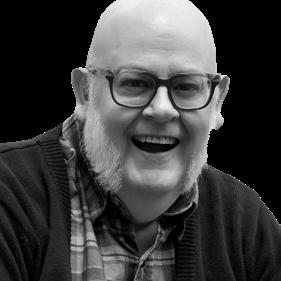
In addition to being the founder and president of Interfaith America, Patel is a civic leader who believes that religious diversity is an essential and inspiring dimension of American democracy. An Ismaili Muslim of Gujarati decent, he was named “one of America’s Best Leaders by U.S. News and World Report. Patel has also served on President Barack Obama’s Inaugural Faith Council, given hundreds of keynote addresses, and written five books.
David Canfield, MAPM/MTS
In his welcome, Garrett-Evangelical President Javier Viera told the graduates that although their commencement comes at a precarious time for humanity and the earth, he wanted the graduates to focus on hope and possibility.
spiritually rigorous work, but your study and formation here have prepared you to be bold, astute leaders who are up to this existential challenge.”
During the ceremony, Garrett-Evangelical conferred honorary degrees upon Patel, The Honorable Richard Gordon (GTS 1973) and Rabbi Wendi Geffen.
mid-1990s, you have this enormous subculture trying to scare the hell out of people,” he remembers. “Satan is just a figurehead for the invisible shadowy corners of that culture—when what folks were really afraid of was their neighbors.” The publication of books like The Late Great Planet Earth —which outsold every book other than the Bible in the 1970s—instilled eschatological panic as a defining feature of fundamentalist Christianity. “All of a sudden, you have people like Mike Warnke giving false testimony about being a Satanist high priest for a decade,” Canfield explains.
“This year, it was especially important to me that we recognize individuals whose work attempts to bridge divides, foster collaboration and cooperation, build interfaith and interreligious alliances, and whose voices rise above the cacophony of trite slogans and rigid ideologies, instead offering wisdom, compassion, and a call to love and serve our neighbors,” Viera said.
Gordon, is a retired California State Assemblyman and political leader, community and social impact leader, and environmentalist. He has been an advocate for LGBTQ rights, environmental and racial justice, prison prevention and reform, and policies that protect and help vulnerable children and teens. Gordon retired after 20 years in public office and now serves as the CEO of the California Forestry Association. (See page tk for more on Gordon.)
Additionally, he said, in a democracy as at a potluck, the leader must reduce barriers, invite a diverse group of people, ask participants to make contributions, create a space where people of diverse identities and divergent ideologies can come together for enriching conversation and varied dishes, and teach people how to take responsibility for the common good.
“The magic at a potluck happens when one person’s crusty bread from Eastern Europe meets another person’s spicy dip from the Middle East, and then these people of different ethnicities and religions, who have divergent views on tax policy and environmental
As she developed this theology, Hopkins found comfort and wisdom in collaboration. “Mark Mooney was actually my field education advisor over the summer,” she exclaims. “I got to meet with him quite a few times—so cool. And Dr. Timothy Eberhart helped me understand creation as more than rocks and trees and water, as an entity with its own life force.” Perhaps even more important, however, were chances she had to study in circles of wider indigeneity. “I got to travel to Healing Our Spirit Worldwide in Vancouver and NAIITS: An Indigenous Learning Community in Manitoba,” she says. “It was so amazing to be there, to learn from indigenous people from Taiwan, Australia, New Zealand, Norway—you
“THE RHETORIC OF FEAR in moral panics never changes—no matter what they’re about, it is always the same.”
“You are being sent out from these hallowed halls as agents of possibility, as cultivators of communities of justice, compassion, and hope,” he said.
During this period, Canfield lived in a religious community, where he worked on Cornerstone magazine, which published the initial feature exposing Warnke as a fraud. The entire experience left a toll on Canfield’s perception of Christianity. “After seeing all this, I needed a new foundation, and I found that here at Garrett-Evangelical,” he confesses. Perhaps fittingly for someone who spent so much time debunking religious phenomena with little basis in scripture, a return to his faith’s core tenets provided a road back. “For me, there are three things that define Christianity,” he says, “the Trinity, the incarnation, and the physical resurrection of Jesus. And I want people to know: God is not looking to ‘get you.’ You’re going to be okay.”
In his speech, Gordon told the graduates that he believes that regardless of their path, the ministry calls people to be builders of community—bringing people together and holding them together; agents of change—helping people accept and embrace change; and servant leaders—putting other people first.
“While many fear the uncertainty that our future holds, I want to encourage you to see in it possibilities to lead transformation, to lead the transformation of your communities and our world in order to reflect the goodness and the intentions of our God, to proclaim in word and deed the love, the mercy, the grace, and yes, the hope that transformed communities can bring to the human family and to the earth that we share as our common home,” he continued. “It will be intellectually and
David Canfield doesn’t strike me as the likeliest candidate for scholarship about Satanic Panic and the culture wars that gripped 1980s America. He speaks with gregarious warmth and infectious laughter. In addition to being a soughtafter expert for books and documentaries on the subject, he’s also a stand-up comedian. However, that joviality is matched by equally shrewd perception about what manufactured crises reveal about white evangelical insecurities. “Starting with the publication of Michelle Remembers up through the
Geffen has been affiliated with North Shore Congregation Israel in Glencoe, Illinois since 2002, first, as part of the rabbinic team and then in 2015, as the senior rabbi. Geffen is also a leader in the national Jewish community and serves on the Executive Board of the Chicago Board of Rabbis and numerous local Jewish and communal boards. She is also a sought-after commentator on issues of interreligious and national importance.
She told the graduates that although they are graduating in “an incredibly
The simple love and promise of those claims stand in stark contrast to the wild excesses that defined the Satanic Panic. And yet, when it came time to write his master’s thesis ahead of his impending graduation, he found his mind drawn back to the 1980s because of how it rhymes with our present. “The psychosocial anxieties of Evangelical Christianity are a fear of being replaced, a fear of being tainted, a fear of losing control of their children and their children’s future,” Canfield says. “Honestly they’re fears that they haven’t let Christianity address, so their faith has been left behind.” While the form that shadowy specter takes has now shifted, its
essential nature remains unchanged. “If we think of today’s Q-Anon movement or Christian nationalism,” he offers, “we see this movement trying to cling to a past in which white evangelical power was centralized and unquestioned.”
fraught time” of violence, suffering, pain, loneliness, and isolation, she hoped that they will avoid a singular point of view and instead talk and listen to one another.
Also, during the service, Dr. Ahyun Lee, (G-ETS 2015) assistant professor of pastoral theology, care, and psychotherapy, was awarded the Exemplary Teacher Award for her excellence as a teacher, her service to students, her commitment to education, and her record of significant contributions to the scholarly life of Garrett-Evangelical.
Knitted together, his scholarship on Satanic Panic, his stand-up comedy, his passion for horror movies, and his faith—this is the gift he hopes to share after graduation. “My thesis project is called 'Wouldst Thou Like to Live Deliciously? A Church Hungry for Monsters,'” he says. But tracing the rhetoric of fear brings him to focus on its opposite. “None of that matters,” he concludes. “When I die, all that matters will be, ‘Did people know that they were loved? Did they know that they were cared for?’ That’s what I hope to carry out of Garrett-Evangelical and model for the world.” Perhaps by studying monsters, he can help birth a world where people stop making them out of their neighbors.
For the Class of 2024, the seminary awarded seven doctor of philosophy degrees, 14 doctor of ministry degrees, three master of theological studies degrees, two master of arts in formation, culture, and educational leadership degrees, three master of arts in public ministry degrees, 12 master of arts in pastoral care and counseling degrees, and 28 master of divinity degrees. In addition, the seminary recognized one student who completed the basic graduate theological studies. †

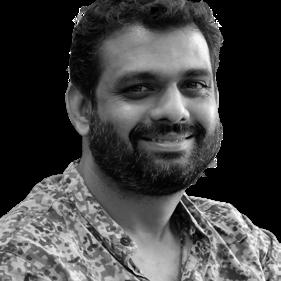
Praveen Raj, MAPM
CLIMATE CHANGE IS too often discussed as an existential crisis instead of a particular threat, until the moment it becomes acutely personal. Growing up in Kerala, a state in South India, Praveen Raj reports that he used to think about ecological disaster in more general terms. “Kerala is a beautiful place,” he
says. “Whenever people talked about global warming, I always thought about it as something happening somewhere else, not connected with us and our land.” Without warning, notions of a formless danger dramatically ended. “In 2017, 2018, and 2019, Kerala was hit by heavy floods from Monsoon change,” Raj says. “My parents’ house is in a rural area surrounded by hills and was damaged by a landslide.” Suddenly, what was once theoretical caused profound and concrete harm. “On the other side of the house, they were constructing unapproved real estate, which contributed to the landslide,” he explains. “In that moment I realized, it’s not happening somewhere else; it’s here, and my theology must respond to the ongoing ecological disaster.”
When he matriculated, he had a different relationship to climate catastrophe, but he didn’t yet possess the analytical tools to make full sense of what he and his family suffered. “I had heard about systems of domination and capitalism, but I was not able to name those issues in particular,” Raj confesses. “Dr. Timothy Eberhart and his mentorship helped me identify structurally what is happening and discover hope in theology. It gave me a lens to look at these issues, how they manifest in the United States, and connect them to what is happening in India.” He became especially focused on the way climate change disproportionately affects the people who are already most vulnerable. “The courses helped connect theory and theologies of public social justice to methods and models for social change,” he says. “Once I better understood environmental racism, I was able to ask, ‘Where are they developing and at whose cost? How does this harm poor people? Who is in pain?’”
In response, Raj is working with a coalition of churches to ameliorate harm, while pushing for more systemic change. The project attempts to envision a climate-resilient community-building project in Amboori, Kerala,
“My theology must respond to the ongoing ecological disaster.”
India to facilitate an anticipatory community in the context of natural disasters, especially landslides. “Even if we can’t prevent landslides on a larger scale, at least we can create a network of churches to try to stop these kinds of environmental disasters through bioengineering, vegetable gardening, and permaculture,” he explains. “And when landslides do happen, the churches can give honorariums to help people survive for the time being and to rebuild.” The project draws inspiration from a theological framework, primarily emphasizing the theme of being ‘born-again,’ which advocates for the transformative rebirth and renewal of the community toward environmental sustainability and resilience. Central to this effort is the role of the local church, envisioned as a pivotal agent in nurturing an anticipatory community mindset and facilitating sustainable living practices.
This calling, and the way Raj’s work has flourished at Garrett-Evangelical, has led him to stay here and begin a PhD program, so he can deepen his understanding and develop more tools to bring back to his work in India. “My stories of ancestral struggles and liberation tales are tied to eco-memory. In my doctoral work, I plan to connect my eco-memory with the eco-memory of Christ,” Raj concludes. “Jesus’s deep incarnation united him with the entire biological world, revealing his symbiotic life with the land and the whole creation." †
On Friday, May 17, the 2024 graduates of Garrett-Evangelical Theological Seminary celebrated with their family and friends and listened to advice on how to minister in this deeply divided world. The 168th annual commencement ceremony was held at the Alice Millar Chapel in Evanston, Illinois.
Commencement speaker, Dr. Eboo Patel, reminded the graduates that they have spent the last several years growing their knowledge, cultivating their skills, and deepening their faith so they can “build bridges of cooperation” in a diverse democracy.
By Benjamin Perry
O“There are many ways to lead in a diverse democracy, and I hope you engage in all of them,” said Patel, the founder and president of Interfaith America, the leading interfaith organization in the United States. “Vote, canvas, make speeches, start an organization, join a club, run for office, lead your church, protest peacefully (but not during my speech), and host potlucks.”
A potluck, according to Patel, “is the ultimate democratic form, . . . an event of the people, by the people, for the people.” In order for it to be successful, Patel said, someone must be a leader and step up to host the potluck. “Everything always starts with a leader,” he said. “Today, I am asking you to be that person.”
n Friday, May 17, at the 168th Annual Commencement, Garrett-Evangelical Theological Seminary celebrated more than the graduating students. Amid the day’s jubilation, President Javier Viera conferred an honorary doctorate upon The Honorable Richard Gordon (GTS 1973), recognizing his remarkable career in public service. That morning, Viera described how Gordon has dedicated his life “to strengthen his community and to give voice, agency, and visibility to those who might not otherwise have it.” From decades providing direct aid to at-risk youth, to forming recovery programs, creating a job training site, and serving lengthy terms in elected office, Gordon bears witness to Garrett-Evangelical’s mission, said Viera, “as one who walks in the way of Jesus to cultivate communities of justice, compassion, and hope.”
Additionally, he said, in a democracy as at a potluck, the leader must reduce barriers, invite a diverse group of people, ask participants to make contributions, create a space where people of diverse identities and divergent ideologies can come together for enriching conversation and varied dishes, and teach people how to take responsibility for the common good.
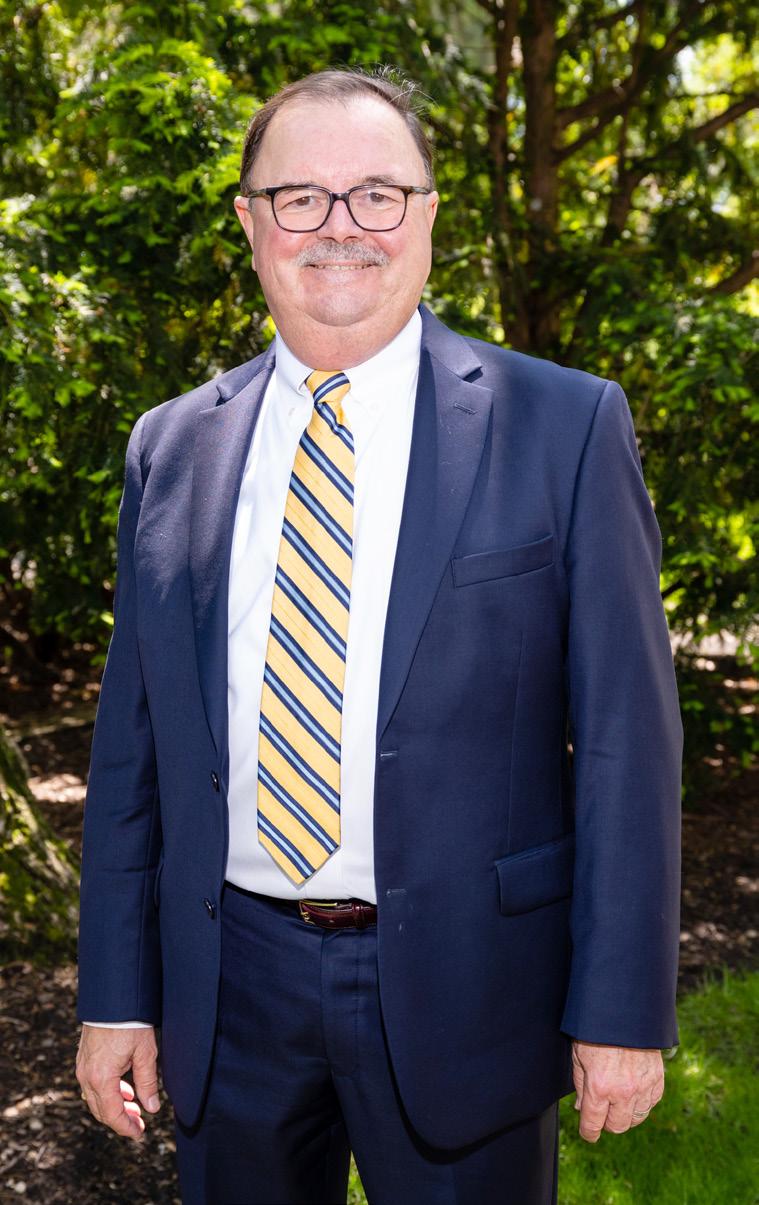
as cultivators of communities of justice, compassion, and hope,” he said.
people first.
As Gordon shared with those assembled, however, his life almost took a different path. Ordained as a deacon the year after he graduated from Garrett, Gordon served an outreach street ministry in Chicago, working with young folks in the area. After a year in that position, however, his bishop called and told him it was time to return home to California and fill an empty pulpit. “I said to him, ‘the work that I am doing
“The magic at a potluck happens when one person’s crusty bread from Eastern Europe meets another person’s spicy dip from the Middle East, and then these people of different ethnicities and religions, who have divergent views on tax policy and environmental
with at-risk youth is my ministry,’’’ Gordon told the graduates. “[The bishop] said, ‘You’ll come home and take a pulpit, or you’ll lose your ordination. You’ll never become an elder.’” The words with which Gordon responded would determine the trajectory of his life. “I said to the bishop,” Gordon recalled, “I will give up my ordination in order to continue my ministry.”
It was a pivotal choice and one that Gordon confessed he struggled with. “I didn’t reply that day,” he told me.
“While many fear the uncertainty that our future holds, I want to encourage you to see in it possibilities to lead transformation, to lead the transformation of your communities and our world in order to reflect the goodness and the intentions of our God, to proclaim in word and deed the love, the mercy, the grace, and yes, the hope that transformed communities can bring to the human family and to the earth that we share as our common home,” he continued. “It will be intellectually and
“But I thought and prayed about it and realized that the path I was on was the one God had for me. If it meant that I wasn’t ordained, well that’s just a title. It didn’t interfere with my ministry.”
This personal integrity, the willingness to follow his conscience even when it placed him on possibly unsteady ground, would become a defining feature of Gordon’s life.
Geffen has been affiliated with North Shore Congregation Israel in Glencoe, Illinois since 2002, first, as part of the rabbinic team and then in 2015, as the senior rabbi. Geffen is also a leader in the national Jewish community and serves on the Executive Board of the Chicago Board of Rabbis and numerous local Jewish and communal boards. She is also a sought-after commentator on issues of interreligious and national importance.
She told the graduates that although they are graduating in “an incredibly
Some years later, now running youth programs at a YMCA in California, he approached another momentous
Living Legacy: The Honorable Richard Gordon turned the skills and values he learned at Garrett into a life of public service.
fraught time” of violence, suffering, pain, loneliness, and isolation, she hoped that they will avoid a singular point of view and instead talk and listen to one another.
Also, during the service, Dr. Ahyun Lee, (G-ETS 2015) assistant professor of pastoral theology, care, and psychotherapy, was awarded the Exemplary Teacher Award for her excellence as a teacher, her service to students, her commitment to education, and her record of significant contributions to the scholarly life of Garrett-Evangelical.
decision. He had married soon after he graduated from Garrett to a woman he loved deeply. In his heart, however, Gordon knew that he was gay. “I had always known, but I was so deep in the closet that I would find ways to shield myself from thinking about it,” Gordon remembered. “But as time went on, I said, ‘I can’t live a lie. This isn’t who I am.’” The choice come out, however, carried so much in its balance. “I not only worried about what would happen with my work, but also with my marriage to a woman I loved dearly, my best friend in life,” Gordon shared. “So much time asking myself: What’s going happen?”
For the Class of 2024, the seminary awarded seven doctor of philosophy degrees, 14 doctor of ministry degrees, three master of theological studies degrees, two master of arts in formation, culture, and educational leadership degrees, three master of arts in public ministry degrees, 12 master of arts in pastoral care and counseling degrees, and 28 master of divinity degrees. In addition, the seminary recognized one student who completed the basic graduate theological studies. †
Eventually, he mustered the courage to tell his wife and the world the true self God created him to be. Once again, his faith was rewarded. After the initial shock, he and his wife were able to turn their marriage into a lifelong friendship. And his forthrightness with his community likewise bore fruit. “The executive director of the YMCA told me, ‘I don’t know that we can keep employing you. I’m afraid we’re going to lose all our government contracts when people find out,’” Gordon said. “So, I went to the local police chief, the county chief probation officer, the county health director, the mental health director—all the folks the YMCA had contracts with—and came out to them. They all supported me, and I kept my job.”
This honesty is part of the faith Garrett instilled in him. “We are called to live whole lives, and that requires authenticity,” he said. “I can’t disassociate from my truth. I must live that in the world.” So often, many of us fear that revealing the truest versions of ourselves will meet criticism or condemnation. One thing Gordon feels called to proclaim is the abundant life that waits beyond those anxieties. “Frankly, I’ve
never found that living truth creates a problem,” he said. “In fact, quite the opposite; it’s liberating and helps me carry a message of faith in the world.”
As he campaigned for elected office— an arena not universally known for truth and integrity—that embodied faith continued to be his lodestar. “When I ran the first time, we were at a debate. I stood up and said something that people didn’t want to hear, that no politician in that community had ever said before, and I looked at my campaign manager—I thought he was going to die,” Gordon laughed. “He asked me afterward, ‘Why did you do that?’ And I said, ‘I’m not going to run for office and lie.’ I can’t tell you how many people came up to me after that debate and said, ‘We weren’t sure about voting for you before, but now we will—you’re honest.’”
His time in office was also marked by a commitment to bipartisanship. In stark contrast to much of present politics, Gordon worked across the aisle because he cared more about serving the people of California well than scoring political points. “At the end of one legislative session, a Republican colleague who lived in a forested area came to me and said, ‘We need to thin the forests to help deal with wildfires. You have a piece of legislation you’re not using, can I have it?’” Gordon remembered. “And I said, ‘No you can’t have it.
We’ll do this together.’”
While this track record might seem idiosyncratic to a wider culture, Gordon maintains it’s actually simple: They’re religious values he learned at Garrett. “One of the things Garrett taught me is the importance of being in communion with others,” Gordon said. “While I was there, I built friendships that have lasted a lifetime. So, wherever I’ve gone and whatever I’ve done, I’ve tried to foster community and bring people together.” Similarly, while he’s grateful for the practical skills he learned at Garrett, like public speaking and deep knowledge of the Bible, he was shaped just as deeply by how his time in seminary helped him discern his identity and how he was called to serve. “There were evenings that we would sit up late into the night talking about who and how we wanted to be in the world,” he said.
Now, he’s delighted to find himself able to also give back financially to the school that so powerfully formed him. “My financial commitment to Garrett-Evangelical is relatively new— only within the last three years,” Gordon confided. “Candidly, part of that has been President Viera’s leadership, a sense that what I experienced— embracing social change, civil justice, commitment to environmental issues, the things we talked about late at night in Loder Hall—that this door has been opened again.” To support students who feel called to serve outside of congregations, he and his husband Dr. Dennis McShane have established a scholarship for public ministry.
“Whatever I’ve done, I’ve tried to foster community and bring peopletogether.”
“Part of what I learned at Garrett was defining ministry in a broad context,” he said. “It doesn’t necessarily mean ordination; it’s a way of being in the world. Your faith is evidenced by the way you live and by your actions.” Fifty years after sacrificing his ordination to pursue his call, one thing was abundantly clear to everyone in that commencement chapel: Gordon’s ministry has been just as real and potent as any served inside a pulpit. †
On Friday, May 17, the 2024 graduates of Garrett-Evangelical Theological Seminary celebrated with their family and friends and listened to advice on how to minister in this deeply divided world. The 168th annual commencement ceremony was held at the Alice Millar Chapel in Evanston, Illinois.
Rethinking Nurture:
Dr. Esther E. Acolatse draws on her Ghanaian heritage as she helps students craft a collective ethic of pastoral care.
Commencement speaker, Dr. Eboo Patel, reminded the graduates that they have spent the last several years growing their knowledge, cultivating their skills, and deepening their faith so they can “build bridges of cooperation” in a diverse democracy.
“There are many ways to lead in a diverse democracy, and I hope you engage in all of them,” said Patel, the founder and president of Interfaith America, the leading interfaith organization in the United States. “Vote, canvas, make speeches, start an organization, join a club, run for office, lead your church, protest peacefully (but not during my speech), and host potlucks.”
A potluck, according to Patel, “is the ultimate democratic form, . . . an event of the people, by the people, for the people.” In order for it to be successful, Patel said, someone must be a leader and step up to host the potluck. “Everything always starts with a leader,” he said. “Today, I am asking you to be that person.”
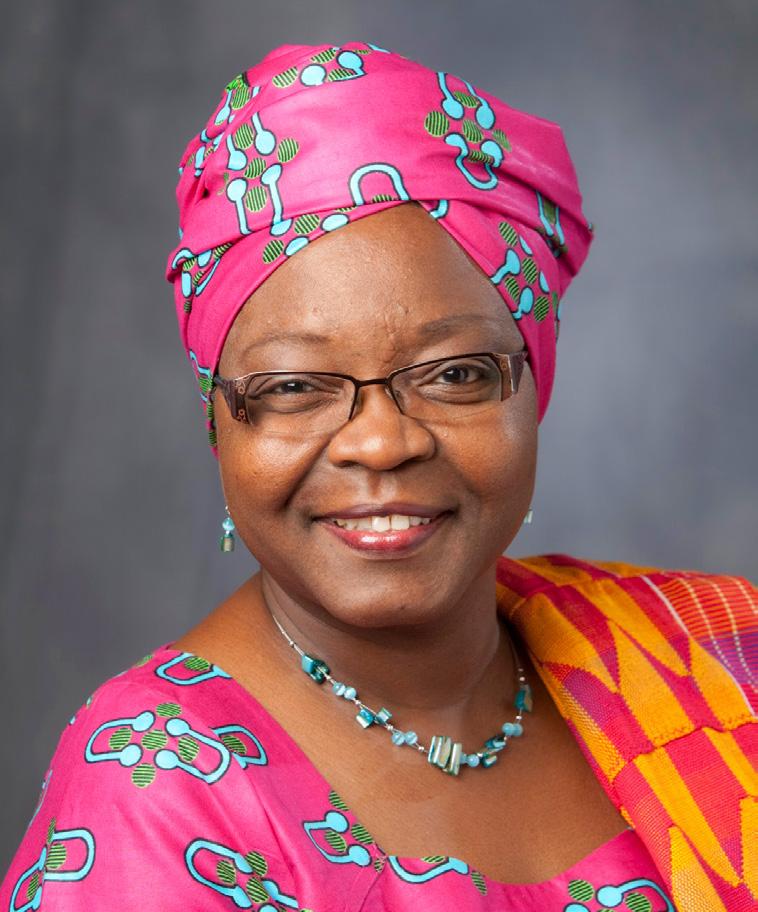
Barack Obama’s Inaugural Faith Council, given hundreds of keynote addresses, and written five books.
WIn his welcome, Garrett-Evangelical President Javier Viera told the graduates that although their commencement comes at a precarious time for humanity and the earth, he wanted the graduates to focus on hope and possibility.
in public office and now serves as the CEO of the California Forestry Association. (See page tk for more on Gordon.)
A Conversation with Dr. Esther E. Acolatse
By Benjamin Perry
Additionally, he said, in a democracy as at a potluck, the leader must reduce barriers, invite a diverse group of people, ask participants to make contributions, create a space where people of diverse identities and divergent ideologies can come together for enriching conversation and varied dishes, and teach people how to take responsibility for the common good.
“The magic at a potluck happens when one person’s crusty bread from Eastern Europe meets another person’s spicy dip from the Middle East, and then these people of different ethnicities and religions, who have divergent views on tax policy and environmental
“You are being sent out from these hallowed halls as agents of possibility, as cultivators of communities of justice, compassion, and hope,” he said.
estern culture has a complicated relationship with grief. In Victorian England, elaborate mourning rituals were created, including elephantine, six-foot veils designed to obscure whether the mourner might be weeping. Historians report how the arsenic-laden crepe used for their construction led to headaches, skin irritation, and even death, but the isolation it created around emotional pain is perhaps more damaging—and persists long after the veils, themselves, went out of fashion. Even today, many people still experience grief as something they must shoulder alone, for fear of becoming a burden on others. In that context, pastoral care often becomes a service offered by a religious professional, privatized and removed from the rest of the community.
In his speech, Gordon told the graduates that he believes that regardless of their path, the ministry calls people to be builders of community—bringing people together and holding them together; agents of change—helping people accept and embrace change; and servant leaders—putting other people first.
throughout Africa, observes Dr. Esther E. Acolatse, professor of pastoral theology and world Christianity at GarrettEvangelical. These practices prioritize the role of a community response. “My aunt just died,” she says. “People have been coming since Friday with things that might help one to bury their dead.” In the traditional Ghanaian funerary rituals, even washing the body of the deceased becomes a communal process. “Everybody brings part of what is used to wash,” she explains. “The immediate family will bring the sponge and soap, but they will levy everybody so that they feel they have offered substance for this mortuary rite.”
This individualized experience of moving through grief could not be more different from traditional practices
“While many fear the uncertainty that our future holds, I want to encourage you to see in it possibilities to lead transformation, to lead the transformation of your communities and our world in order to reflect the goodness and the intentions of our God, to proclaim in word and deed the love, the mercy, the grace, and yes, the hope that transformed communities can bring to the human family and to the earth that we share as our common home,” he continued. “It will be intellectually and
Geffen has been affiliated with North Shore Congregation Israel in Glencoe, Illinois since 2002, first, as part of the rabbinic team and then in 2015, as the senior rabbi. Geffen is also a leader in the national Jewish community and serves on the Executive Board of the Chicago Board of Rabbis and numerous local Jewish and communal boards. She is also a sought-after commentator on issues of interreligious and national importance.
She told the graduates that although they are graduating in “an incredibly
This collective approach in tending to the deceased’s loved ones ensures that no one moves through sorrow alone. “Communal caring practices underscore the connectedness of all human life,” Acolatse says. “To do care by looking at the individual is embedded in Western structures and foreign to
the African conception of how the community carries grief as a whole.” This difference in emphasis doesn’t just change how compassion is organized, but it also affects people’s emotional experience. “In the West, people talk about stages of grief,” she explains, “but the way it functions here, there’s so much storytelling with each new group of people that comes in. By the time the funeral and mortuary rites actually begin, they’ve already worked through the grief with the community.”
fraught time” of violence, suffering, pain, loneliness, and isolation, she hoped that they will avoid a singular point of view and instead talk and listen to one another.
Also, during the service, Dr. Ahyun Lee, (G-ETS 2015) assistant professor of pastoral theology, care, and psychotherapy, was awarded the Exemplary Teacher Award for her excellence as a teacher, her service to students, her commitment to education, and her record of significant contributions to the scholarly life of Garrett-Evangelical.
“Many people still experience grief as something they must shoulder alone.”
harrowing epidemic, the relief that connectedness can provide may be greater than anything an individual minister can do or say. “When bodies are in connection with other bodies,” Acolatse explains, “healing is already beginning. Sustaining is already beginning. Reconciling is taking place in the interconnectedness because it is in the interconnectedness that we will quarrel, that we are real with one another. African ways of being already have inbuilt pastoral care.”
For the Class of 2024, the seminary awarded seven doctor of philosophy degrees, 14 doctor of ministry degrees, three master of theological studies degrees, two master of arts in formation, culture, and educational leadership degrees, three master of arts in public ministry degrees, 12 master of arts in pastoral care and counseling degrees, and 28 master of divinity degrees. In addition, the seminary recognized one student who completed the basic graduate theological studies. †
Christianity and the introduction of colonial values have changed some of these practices, Acolatse observes, but for the most part, the ecclesial model has not supplemented traditional customs. Instead, the old ways and new sit—sometimes uneasily—side by side. One difference is that, traditionally, much of the collective care work was organized by women, a practice at odds with churches in which liturgical rituals are often led by men. “In church, you’ll find ways in which the woman subvert patriarchy—for example, by bursting into song in the middle of a sermon,” she says. “Say, the minister is preaching a sermon about Lazarus since we are in grief. Suddenly, the women’s group might start singing
about Mary and Martha and how they opened the way for Jesus to bring Lazarus out of the grave.”
Acolatse believes that Westerners can learn much about pastoral care from African communal care practices. “In more formal or professionalized understandings of pastoral care,” she explains, “we lose that communal ethos, and we lose the connectedness.” This is particularly devastating given how alone and isolated many people already feel. “The surgeon general is telling us that loneliness is one of the deadliest diseases in the Western world,” she notes, “close to the health risks from smoking.” Given this
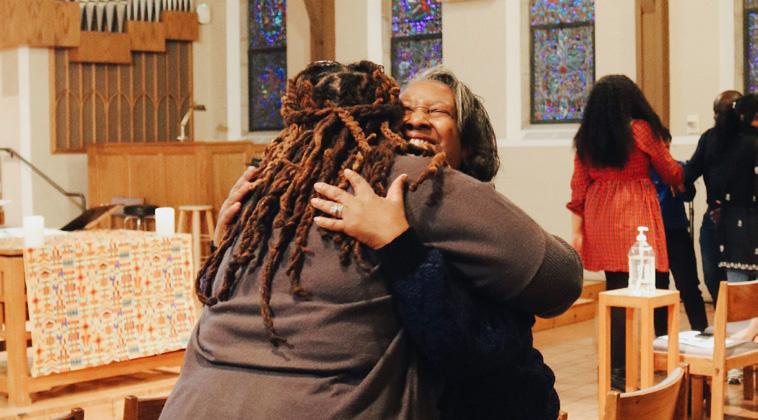
Living What We Study: Pastoral care isn’t just a topic students learn intellectually. In our living, campus life rehearses the loving community our graduates foster.
In thinking about this shift, Acolatse offers the practice of midwifing as a model to which ministers should look when thinking about care, partly because it pushes back against the image of a minister as a doctor ministering to the sick toward an image of someone who works out of the community to provide partnership to the one who is suffering. It also changes the understanding of who is doing the labor. “When you midwife, you don’t do the work alone,” Acolatse says, “You do the work with the one who is birthing. And so, if it is me in my pain and you midwife me through it, you’re not giving me something. You’re helping me do something.”
This not only rightfully returns a sense of agency to the person who is suffering, but it also reduces the pressure on the minister. “There is something very freeing about thinking of pastoral care as midwifing because I’m not the one in labor,” Acolatse laughs. “The fuller and harder work is done by you, not by the midwife.” Hopefully, by using this frame, churches can reemphasize the role of community in providing care and easing the burden felt by ministers who often already shoulder too much. Throughout, it’s an opportunity to invite God to move in fresh ways. “God connects to us when we reconnect to people,” Acolatse observes. “In the midst of all this is the larger connectedness to the transcendent that ties us to all human life with the reminder: We are never alone.” †
On Friday, May 17, the 2024 graduates of Garrett-Evangelical Theological Seminary celebrated with their family and friends and listened to advice on how to minister in this deeply divided world. The 168th annual commencement ceremony was held at the Alice Millar Chapel in Evanston, Illinois.
Commencement speaker, Dr. Eboo Patel, reminded the graduates that they have spent the last several years growing their knowledge, cultivating their skills, and deepening their faith so they can “build bridges of cooperation” in a diverse democracy.
This summer, Dr. Jennifer Harvey’s newest book, AntiRacism as Daily Practice: Refuse Shame, Change White Communities, and Help Create a Just World focuses on uprooting the kinds of shame that inhibit organizing efforts. Below, read an interview excerpt explaining that theme.
Benjamin Perry (BP): “Refusing shame,” is right in the title for your book. Why did you feel like this was such an essential part of moving more white people toward antiracism?
“There are many ways to lead in a diverse democracy, and I hope you engage in all of them,” said Patel, the founder and president of Interfaith America, the leading interfaith organization in the United States. “Vote, canvas, make speeches, start an organization, join a club, run for office, lead your church, protest peacefully (but not during my speech), and host potlucks.”
Jennifer Harvey (JH): I’ve noticed a trend in the past 5-10 years, as the visibility of white antiracism has risen. I’ve worked in these movement spaces for more than 25 years, but
A potluck, according to Patel, “is the ultimate democratic form, . . . an event of the people, by the people, for the people.” In order for it to be successful, Patel said, someone must be a leader and step up to host the potluck. “Everything always starts with a leader,” he said. “Today, I am asking you to be that person.”
Additionally, he said, in a democ racy as at a potluck, the leader must reduce barriers, invite a diverse group of people, ask participants to make contributions, create a space where people of diverse identities and divergent ideologies can come together for enriching conversation and varied dishes, and teach people how to take responsibility for the common good.
Hot Off the Press!
Antiracism as Daily Practice hits shelves July 16. Need a guide to everyday actions for racial justice? Order your copy today wherever books are sold!
“The magic at a potluck happens when one person’s crusty bread from Eastern Europe meets another person’s spicy dip from the Middle East, and then these people of different ethnici ties and religions, who have divergent views on tax policy and environmental
regulation, and yes, on even more polarizing things, they are together sharing sacred stories of family rituals behind their favorite dish,” he said.
more recently, I’ve seen an increasing temptation to use shame against other white folks, to throw away people who don’t yet know what they should be doing. This book is an attempt to tell a broader culture of white antiracism that we must stop weaponizing shame. We have to tap into grief and love and stay in relationship with other white people instead of giving into the tendency to discard folks who aren’t where we want them to be. That part of the book feels scary, but I decided to write it anyway because I think it’s true.
Patel also said that a diverse democracy requires safe spaces “where people who disagree on some fundamental things can come together on other fundamental things.” “I believe that such spaces are the solution to so many of our current challenges, particularly the challenges of polarization and isolation,” he said. “When you open your home or your church to people whose doctrine you might disagree with, but whose dish you find delicious, you are creating a sacred space for the creation of community.”
BP: So how can we help people unlearn that shame?
In addition to being the founder and president of Interfaith America, Patel is a civic leader who believes that religious diversity is an essential and inspiring dimension of American democracy.
spiritually rigorous work, but your study and formation here have prepared you to be bold, astute leaders who are up to this existential challenge.”
During the ceremony, Garrett-Evangelical conferred honorary degrees upon Patel, The Honorable Richard Gordon (GTS 1973) and Rabbi Wendi Geffen.
done. I’m also worthy because we all are necessary to this work, and we all deserve wholeness. We need to make it clear: I’m not going to throw you away, even if you make a very racist mistake. I am going to hold you accountable, but I’m going to love you through the process of accountability.
“This year, it was especially important to me that we recognize individuals whose work attempts to bridge divides, foster collaboration and cooperation, build interfaith and interreligious alliances, and whose voices rise above the cacophony of trite slogans and rigid ideologies, instead offering wisdom, compassion, and a call to love and serve our neighbors,” Viera said.
I have some stories in the book where people of color held me accountable with anger and with love. When I did the process of accountability, as I was asked to do and which I did owe, I also learned, “Oh, I get to return to relationship.” That’s what white folks have to give to one another, and that’s one of the ways we must change white antiracist culture. †
An Ismaili Muslim of Gujarati decent, he was named “one of America’s Best Leaders by U.S. News and World Report Patel has also served on President Barack Obama’s Inaugural Faith Council, given hundreds of keynote addresses, and written five books.
JH: Part of how you interrupt any kind of shame is you expose the thing to sunlight. Those of us who now feel less shame can give love to other folks when they’re experiencing shame, to hold up a mirror and say you are worthy despite whatever things you’re complicit in, despite what you’ve done—despite what I’ve also
In his welcome, Garrett-Evangelical President Javier Viera told the graduates that although their commencement comes at a precarious time for humanity and the earth, he wanted the graduates to focus on hope and possibility.
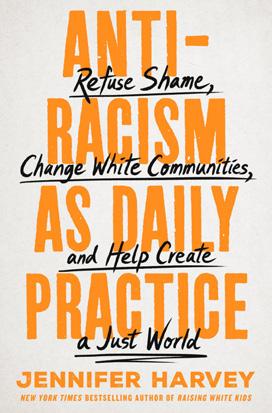
“You are being sent out from these hallowed halls as agents of possibility, as cultivators of communities of justice, compassion, and hope,” he said.
“While many fear the uncertainty that our future holds, I want to en courage you to see in it possibilities to lead transformation, to lead the transformation of your communities and our world in order to reflect the goodness and the intentions of our God, to proclaim in word and deed the love, the mercy, the grace, and yes, the hope that transformed communities can bring to the human family and to the earth that we share as our common home,” he continued. “It will be intellectually and
Read the rest of the interview at garrett.edu/refusingshame
Gordon, is a retired California State Assemblyman and political leader, community and social impact leader, and environmentalist. He has been an advocate for LGBTQ rights, environmental and racial justice, prison prevention and reform, and policies that
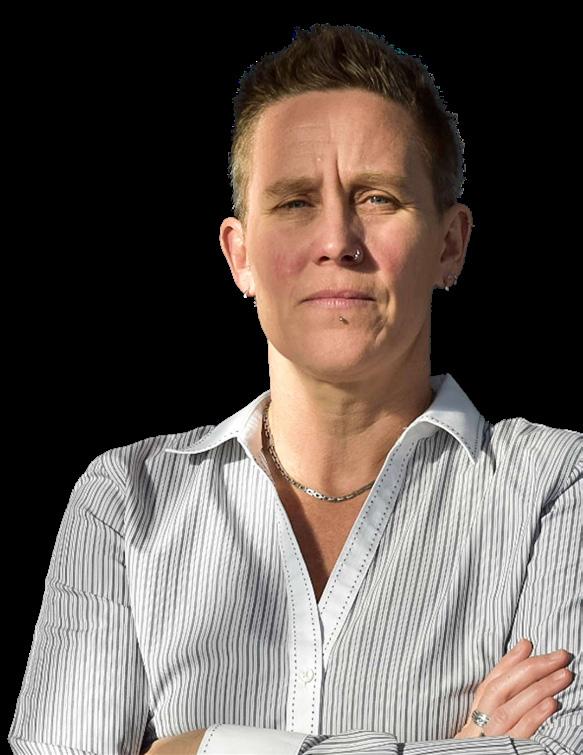
fraught time” of violence, suffering, pain, loneliness, and isolation, she hoped that they will avoid a singular point of view and instead talk and listen to one another.
Julius C. Trimble (G-ETS 1983) has been elected general secretary for the General Board of Church and Society (GBCS) of The United Methodist Church, effective September 1.
been appointed Northern Illinois Conference Director of Congregational Development, effective July 1.
Memory Model of God: A Wesleyan and Neuroscientific Prospect, WIPF and Stock Publishers (2024).
Bradley S. Bartelmay(G-ETS 1988) was hired as the senior director of mentored learning for The United Methodist Foundation of Michigan.
Also, during the service, Dr. Ahyun Lee, (G-ETS 2015) assistant professor of pastoral theology, care, and psychotherapy, was awarded the Exemplary Teacher Award for her excellence as a teacher, her service to students, her commitment to education, and her record of significant contributions to the scholarly life of Garrett-Evangelical.
Tracy Smith Malone (G-ETS 1993) took the mantle as the new president of the Council of Bishops (COB) at the General Conference in Charlotte, N.C.
Wendy C. Hardin Hermann (G-ETS 1997) has been appointed Prairie Central District Superintendent effective July 1.
Christian T. Coon (G-ETS 1998) has
For the Class of 2024, the seminary awarded seven doctor of philosophy degrees, 14 doctor of ministry degrees, three master of theological studies degrees, two master of arts in formation, culture, and educational leadership degrees, three master of arts in public ministry degrees, 12 master of arts in pastoral care and counseling degrees, and 28 master of divinity degrees. In addition, the seminary recognized one student who completed the basic graduate theological studies. †
Ventra Asana (G-ETS 1999) contributed to Ecosocial Work: Environmental Practice and Advocacy, R. Forbes and K. Smith, Eds. Chapter 14, “Lived Perspectives on the Changing Natural Environment: Voices of Older Detroiters” along with Evan Villanueve, Tam E. Perry, Fatima Hazimeh, and Brenda Faye Butler. NASW Press (2023).
Lindsey Graham Guinn (G-ETS 2007) was hired as the assistant dean of academic affairs at Chicago Theological Seminary, effective May 1.
Kwang-Jin Oh (G-ETS 2012 & 2022) has published a new book titled Bild-ing a
Carolyn Simon, (GBI 1950), Lakeland, FL, died March 17, 2023.
Walter Benjamin, (GBI 1953), Wayzata, MN, died March 23, 2024.
Robert Fields, (GBI 1953), Bloomington, IN, died December 23, 2022.
Edgar H. Munyan, (ETS 1955), Allentown, PA, died June 30, 2018.
G. Clive Cook, (ETS 1956), Marion, IA, died February 23, 2024.
Arthur Runyon, (GBI 1956), Bloomington, IL, died March 3, 2024.
Richard C. Voigt , (ETS 1956), Hershey, PA, died February 19, 2016.
Lowell Johnson, (ETS 1958), Sioux City, IA, died January 15, 2024.
Martha R. Kuhlman, (GBI 1959), Newark, OH, died March 31, 2024.
Harold P. Cooper, (GTS 1963), Wichita, KS, died January 23, 2024.
Lynn DeMoss, (GTS 1963), Grand Rapids, MI, died February 25, 2024.
Duane A. Ewers, (GTS 1965), Nashville, TN, died August 31, 2023.
William A. Hertel , (GTS 1966), Traverse City, MI, died February 18, 2024.
Chuck L. Young, (GTS 1966 & G-ETS 1987), Anchorage, AK, died December 28, 2023.
Donald E. Selger, (GTS 1967), Coon Rapids, MN, died February 28, 2024.
Carrie Whitehurst Parrish, (GTS 1968), Huntersville, NC, died August 18, 2022.
Tina Shelton (G-ETS 2015) published her first novel, This Ain’t No Promised Land: A Novel
Edgar Solis (G-ETS 2017) has been appointed Iowa Annual Conference Director of Connectional Ministries effective July 1.
Taurean Webb (G-ETS 2022) was named the 2024 Humanities Postdoctoral Fellow in Comparative Race and Ethnicity Studies in the Department of African and Black Diaspora Studies (and the Social Transformation Research Collaborative) at DePaul University.
Marvin W. Gaskill , (ETS 1973), Bremen, IN, died February 20, 2024.
Richard Hundrieser, (G-ETS 1983 & 1989), Grand Detour, IL, died January 26, 2024.
Lois J. Grebe, (G-ETS 1991), Milwaukee, WI, died February 5, 2024.
Walter L. Coleman, (G-ETS 2000), Chicago, IL, died April 16, 2024.
Joseph Chrisman, (C.O.S), Logan, OH, died April 9, 2018.
Jewell Perkins Eanes, (G-ETS), Aiken, SC, died April 25, 2024.
Marilyn J. Steele, Tucson, AZ, died December 30, 2023. She is survived by her husband, (G-ETS) Life Trustee, Howard E. Steele.
Is the thought of estate and financial planning overwhelming? If so, we have the answer! Our Planning Your Legacy booklet is packed with tips on how to help you plan for a secure and satisfying future. Scan the QR code with your smart phone or device to request a free copy of Planning Your Legacy. You can also visit PlannedGiving.Garrett.edu, where you will find additional estate and personal planning information.

Still have questions? We are here to help! Contact David Heetland, senior vice president for planned giving, at 847.866.3970 or by email at David.Heetland@Garrett.edu. We look forward to helping you plan your future!
PlannedGiving.Garrett.edu